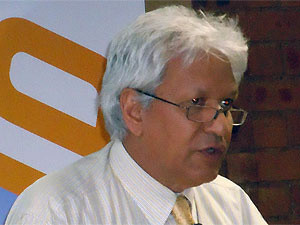
The SA National Roads Agency (Sanral) has acknowledged the e-toll system in Gauteng has run into challenges since it went live nine weeks ago, but says the system is stable.
Most of the billing problems the agency has experienced, it says, relate to database inaccuracy and illegal vehicles.
This is the gist of what the state-owned roads agency presented to the parliamentary portfolio committee on transport today.
Sanral says the positive side of e-tolling has been under-reported. "On the positive side, [the e-toll system] is stable and handling large volumes (high registration volumes and a high number of inquiries), especially as part of the initial ramp-up period."
According to the agency, the system has a monthly user population of about 2.6 million individual vehicles.
E-tag sales
The total number of e-tags taken up to date, says Sanral, is approximately 1.2 million, with over 500 000 individual vehicles having registered since e-tolling commenced on 3 December, and between 30 000 and 45 000 registrations taking place on a weekly basis.
The agency puts the number of users that have so far registered an e-toll account via the e-toll Web site at over 100 000.
Sanral told the committee: "These high numbers indicate that motorists are prepared to cooperate with us in making the system work - a view we have always held, that generally South Africans are law-abiding citizens who are prepared to make their country work."
Sanral CEO Nazir Alli said the agency is thankful to motorists and companies that have registered, "including those who have not registered for e-tags but are nonetheless paying their e-tolls".
Legacy problems
With regard to the challenges Sanral faces, Alli said the e-toll system was "exposing historic problems". A large proportion of the problems he points to relate to the fraught Electronic National Traffic Information System, or eNatis:
- eNatis inaccuracy (eNatis data has not been updated by vehicle owners);
- Cloned and duplicate number plates;
- The number of vehicles without number plates; and
- Vehicles that are not registered on eNatis at all (illegal vehicles).
Alli says over 50% of motorcycles do not wield number plates.
"Due to eNatis inaccuracies and the data thereon not updated by vehicle owners, some users were receiving invoices not meant for them or not receiving invoices at all."
To mitigate this challenge, Sanral told the committee it would embark on an education campaign to urge road users to update their information on eNatis when relocating or changing ownership of vehicles. The agency added it would investigate options to improve vehicle owners' ability to verify their eNatis details online.
Online woes
Sanral said it had been experiencing "erratic communication" with its Web site, causing slowness of operations.
The agency admitted to the committee that there was a need to improve customer services at points of presence and at the e-tolls call centre. "[There is also] the need for additional payment channels."
Alli told the committee Sanral was well aware of the challenges and apologised to road users for any inconvenience caused on behalf of the agency. He went on to say: "A system of this magnitude was always going to have its teething problems but these are not insurmountable."
He said Sanral and its service provider, Electronic Toll Company (ETC), would address all the challenges identified.
Referring to Sanral's earlier statement that "only 0.3%" of the 2.6 million e-road users has raised a complaint (an amount of around 8 000 people) Alli said, despite this, "both Sanral and ETC take each of these complaints seriously".
Share